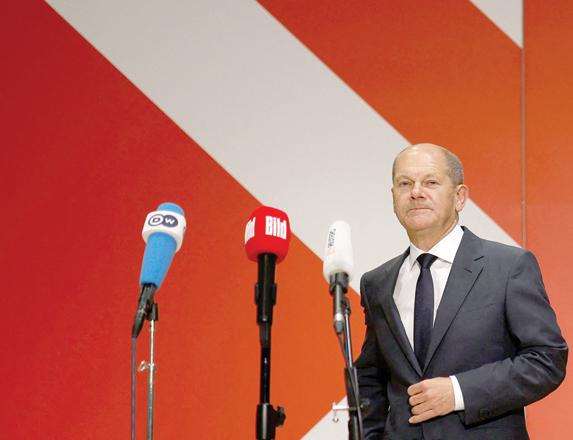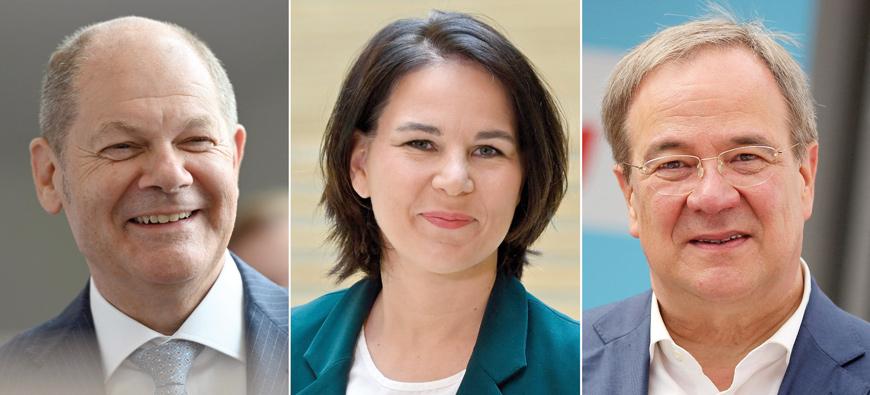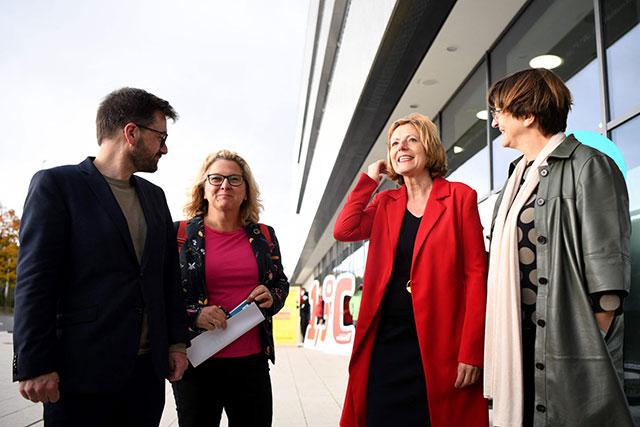You are here
Germany's Scholz gets Merkel boost in coalition battle
By AFP - Sep 30,2021 - Last updated at Sep 30,2021

German Finance Minister, Vice-Chancellor and the Social Democrats (SPD) candidate for Chancellor Olaf Scholz delivers a press statement at the party's headquarters in Berlin on Monday, one day after general elections (AFP photo)
BERLIN — Olaf Scholz's hopes of forming Germany's next coalition government were given a boost Wednesday with congratulations from outgoing Chancellor Angela Merkel and his main rival after his weekend election win.
Merkel's CDU-CSU conservative bloc slumped to its worst ever result in Sunday's general election with 24.1 per cent of the vote, behind Scholz's centre-left Social Democrats (SPD) at 25.7 per cent.
The poll drubbing has left the conservatives in chaos, with senior figures distancing themselves from CDU leader Armin Laschet, who campaigned to replace Merkel and has insisted on trying to build a coalition despite coming second.
Merkel, who is bowing out after 16 years at the helm of Europe’s top economy, had stayed out of the fray but broke her silence in a statement to reveal that she had congratulated Scholz “on his election success” on Monday.
Scholz is the finance minister and vice-chancellor in Merkel’s right-left coalition government.
Laschet had come under fire in recent days for failing to publicly congratulate his opponent as Germany eyes the prospect of weeks, if not months of coalition wrangling likely to dim its engagement on the international scene.
But Scholz did in fact receive a letter of congratulations from Laschet on Wednesday, party sources in the SPD and CDU-CSU told AFP.
The SPD was also buoyed by a selfie posted on Instagram late Tuesday that showed four leading members of the Greens and the pro-business FDP Party smiling after their first — and secret — preliminary talks eyeing up a possible coalition.
‘Bridges’
The parties, which came third and fourth in the election, have emerged as the joint kingmakers of the first post-Merkel government, either under the SPD or the conservatives.
With the Social Democrats and the conservatives ruling out a repeat of their unhappy “grand coalition”, each would need to team up with the two smaller parties to achieve a parliamentary majority.
But the centre-left Greens and the liberal FDP are historically wary of each other, diverging on key issues like tax hikes, climate protection and public spending.
The Greens have signalled they are most comfortable governing with the SPD, while the FDP has been the junior coalition partner in a conservative-led government before.
The caption to the selfie, which went viral, said the Greens and the FDP “were exploring common ground and bridges over divisions. And even finding some”.
Both parties are eager to avoid a re-run of the 2017 election fallout, when the FDP dramatically walked out of talks to cobble together a coalition with the Greens and the conservatives, citing irreconcilable differences.
Laschet lifeline
The kingmaker parties plan to meet again in a more formal setting on Friday.
SPD parliamentary group leader Rolf Muetzenich said his party “is ready anytime for talks about a future coalition of progress”, adding that “many people in Germany” want Scholz to become the next chancellor.
Scholz himself has tweeted that he is “optimistic” about an alliance with the Greens and the FDP, which has been dubbed a “traffic light” coalition after the parties’ colours.
A conservative-Green-FDP alliance has been nicknamed “Jamaica” because their colours match those of that country’s flag.
Greens co-leader Annalena Baerbock said the first meeting with the SPD would take place on Sunday.
“We have a clear mandate for renewal in our country,” she told reporters when asked whether the Greens would consider partnering with the conservatives as well.
The FDP, however, threw beleaguered Laschet a lifeline, with general secretary Volker Wissing announcing that his party plans to hold talks with the CDU-CSU on Saturday, a day before meeting with the SPD.
Wissing said it was “too soon” to say which constellation would eventually emerge.
Policy positions and “the willingness to work together” would be decisive, he added.
Gaffe-prone Laschet is deeply unpopular in Germany and a recent survey found that 71 per cent of Germans thought it was wrong for him to try to claim the chancellery.
Merkel will stay on in a caretaker capacity throughout the coalition wrangling.
Related Articles
FRANKFURT — Germany inched towards a government led by Olaf Scholz after the Greens and the liberal FDP party said Wednesday they would try
BERLIN — Germany's centre-left Social Democrats (SPD) edged ahead in the race towards September elections on Tuesday, beating Angela Merkel'
FRANKFURT — The three parties working to form Germany's next government on Thursday unveiled an accelerated timeline for their coalition ta














